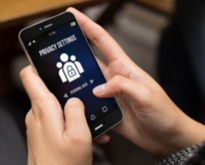In 2018, 75% of people aged 16-74 in the European Union (EU) used a smartphone for private purposes. Yet, 28% responded that when using or installing an app on the smartphone they never restricted or refused its access to personal data. 7% of smartphone users in the EU did not know it is possible to restrict or refuse access to their personal data when using or installing an app on the smartphone.
Less than one half (43%) of smartphones users reported that they had a security system that had been automatically installed or provided with the operating system of their smartphones. A further 15% had subscribed to a security system or used one that had been installed by somebody else.
Highest self-data protection in France, lowest in Czechia
Two thirds of smartphone users in Czechia (67%) never restricted or refused app access to their personal data. They were followed by Bulgaria (49%), Cyprus and the United Kingdom (both 43%).
In contrast, only 10% of smartphone users in France never restricted or refused app access, followed by Germany (16%), the Netherlands and Luxembourg (both 17%).
The source dataset is accessible here.
This article is published on Data Protection Day, celebrated on 28 January. This day marks the anniversary of the Council of Europe’s ‘Convention 108’ on the protection of personal information. Its purpose is to raise awareness and promote privacy and data protection and to inform citizens of their rights and good practices, so enabling them to exercise these rights more effectively.
To contact us: estat-user-support@ec.europa.eu .

